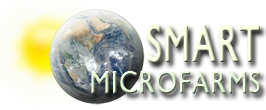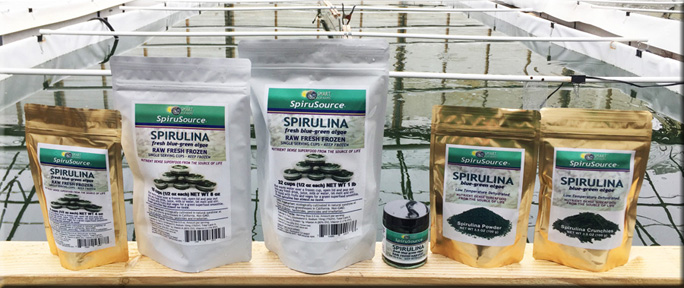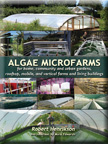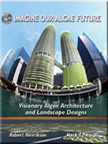Executive Summary
Smart Microfarm technology will empower people globally to grow high value healthy food for the needs of their community locally using sustainable and affordable inputs.
The popular movements of local food security, food self-sufficiency and small scale urban and community gardening are challenged because growing vegetables may be satisfying but not financially sustaining. Market prices for conventional foods are so low that small growers cannot earn a living or support themselves and their families growing food.
For 30 years microalgae like spirulina have attracted a global consumer market as therapeutic superfood supplements. As nutrient dense foods with unusual phytonutrients, consuming small amounts, 3 grams daily, will boost immune function, enhance detoxification, restore beneficial intestinal flora, improve neurological function and rally the body’s own healing response. These superfoods, sold in natural food stores as dietary supplements, have very high market value.
Microalgae are known to be over 20 times more productive per area than terrestrial crops. Algae can be harvested continuously – every day – during the growing season. But to achieve this breakthrough productivity, successful algae cultivation and systems operations have trained and experienced algae experts and PhDs on location. The knowledge level required meant expensive staffing and infrastructure were only available to large commercial farms funded by big investments. Small farms and inexperienced growers could not take advantage of algae’s productivity because they could not maintain stable algae cultures — until recently.
Today, things are changing. Successful systems have been simplified with lower cost of entry. Profitable business models for small growers already exist. Using Smart Microfarm technology, automation and web-based monitoring systems reduce the need for expensive experts on site.
This Smart technology combined with modular growing systems will make it feasible to deploy containerized microfarms anywhere in the world without onsite expert personnel. Remote monitoring enables a single laboratory to support a large number of deployed units. The large user database feeds grower experience into the algae operating system that provides an advanced learning system that offers process automation and a system for grower guidance.
Sustainable Multifunction Algae Regenerative Technologies, Smart Microfarms, mimic nature while growing algae, integrating light and intelligent technology. These adaptable platforms transform solar energy, CO2 and nutrients into products that support health and vitality of people, animals, and plants. Smart Microfarms can extend the natural growing season, and for the first time, offer the possibility of truly climate independent foods.
Business Model
Smart microfarm technology offers the opportunity for multiple income streams from products and training, recurring revenues from support services, and contract R&D.
• Microfarms and Service Contracts Consumer, School and Small Commercial: A suite of smart microfarm units and components and systems sold directly and via retail channels, schools and colleges. Revenue streams include unit sales, optional packages, live cultures, nutrient mixes, online conference training, and recurring service and subscription fees for diagnosis, support and operating systems.
• Contract Commercial Systems and Service Contracts – Customized support for larger scale commercial or humanitarian clients, who may buy licenses for territory and products. Consulting services for setup and operation of commercial algae production facilities. Smart Microfarms may structure royalty, profit or equity share in commercial ventures.
• SmartCulture Growing Systems and Service Contracts – Mobile SmartCulture growing systems deployable to nurseries, municipal park and gardens, community gardens and home and garden consumers. SmartCultures improve yields while regenerating soils.
• Contract Research & Development Projects and Systems – Smart Microfarms principals have the capacity to provide consulting services for commercial, disaster relief or military deployment, linking local users through AlgaeCentral.com with remote experts.
• License Algae Metrics – License proprietary AlgaeOS technology of monitoring, diagnosis, and support for remote growing systems. AlgaeCentral would become the world’s largest database on algae production in hundreds of locations.
• Algae Research – R&D supporting algae industry research, using the large database. The master lab will support many growers in diverse locations.
Algae Industry Evolution and Competition
Over the past 40 years, the algae industry has evolved as a series of large proprietary commercial production companies for high value food and feed products, supplements and nutraceuticals. Recently, well-funded ventures are attempting to develop commercial biofuels. Algae biofuels require huge investments to achieve necessary economies of scale. Large-scale business models require algae experts and PhDs on location, as well as sophisticated and expensive staffing and infrastructure. Considerable competition exists in large algae production systems, but no firms have yet targeted the small but scalable distributed model.
The most common request today is “How can I grow algae?” Gardeners, farmers and algapreneurs want to grow algae without scientific expertise, experience and knowledge. No service currently exists that offers a path to successfully grow and produce algae products. A few entrepreneurial growers have emerged, mostly below the public radar in countries like France, growing spirulina algae in outdoor covered greenhouses, because of its relative ease of cultivation. Parallel to open systems, has been R&D for small-scale enclosed, high-tech biofactories designed to grow algae under more controlled conditions.
The market needs adaptable microfarm platforms that growers can afford. Smart Microfarms will provide kits, training, ongoing materials and grower guidance, and an AlgaeOS operating system. AlgaeCentral will provide a global service network for algapreneurs, cooperatives, community gardens, NGOs and relief organizations enabling production of algae based food, feedstock, and valuable co-products to be produced locally, nearly anywhere in the world.
Marketing and Business Development Strategy
The principals, Robert Henrikson and Mark Edwards, each have over 30 years’ experience in the algae industry. They are well known through their popular books, blogs, videos and articles on algae and agriculture, and speak at algae business and other conferences. They serve on several boards as scientific advisors and frequently contribute to food and energy publications.
The principals collaborated on the International Algae Competition, a global challenge to design visionary algae food and energy systems, building an online global community through social media. The Competition provides a unique market research tool to develop smart microfarms and will spawn several books, videos and worldwide exhibitions. Smart Microfarms will launch to thousands of potential users worldwide.
Prototypes for consumer microfarms are being developed and will be deployed in multiple locations in the western USA, testing designs and remote monitoring and sensing systems. The second round will be in urban community gardens, greenhouse growers, and small farmers.
The principals designed the business to mimic the Smart Microfarms distributed network business model. AlgaeCentral.com will offer expert cloud consulting for the entire network of microfarm platforms distributed globally. Smart Microfarm technology will be contracted with companies that the principals have already identified through their strong relationships in the algae and technology industries. The principals and algae experts will contract and train technicians for day-to-day operations, sales and consultation.
The principals are in discussion with manufacturers and distributors representing thousands of outlets in the hydroponic, garden, and grow shop industry. Urban gardening, hydroponics, and herb cultivation are rapidly growing industries and these sophisticated growers will embrace high-value microcrops. In parallel, the principals have made R&D proposals to investors and organizations for contracts for smart microfarms. This research will provide immediate revenue streams while developing smart microfarm units and support technology.
Management
Robert Henrikson and Mark Edwards have been building capacity for Smart Microfarms LLC for the prior five years. The principals are assembling a team of algae scientists and engineers to help develop smart microfarm products and system development.
Robert Henrikson has over 30 years experience in sustainable development of natural resources such as algae, bamboo and forest carbon. Robert began algae production in 1977 and was founder and director of Earthrise Farms, which became the world’s largest spirulina algae farm in the 1990s. For 20 years Robert, was President of Earthrise Company, pioneer in algae, developing Earthrise® brand products in the USA and 30 countries. During that period he traveled the world promoting the health and environmental benefits of algae through hundreds of articles, publications, interviews and presentations. He authored Earth Food Spirulina in 1989, translated into 6 international editions, updated in 2010 as Spirulina World Food. Robert founded Algae Alliance in 2009, and is a consultant to companies and investors in algae ventures, and in 2010, founded the International Algae Competition, attracting 140 remarkable entries from 40 countries. In 2012, with Mark Edwards, Robert published Imagine Our Algae Future- how growing algae will change the world and improve our lives, a full color book based on the International Algae Competition, available through Amazon.com. Next book planned for release in early 2013 is on Algae Microfarms.
Mark Edwards served for 22 years as CEO of TEAMS International, the advanced assessment, software and technology firm he founded. Mark served as lead consultant for over 600 organizations globally in advanced metrics, leadership assessment and development, and new product development. The Financial Times named Mark one of the top 50 CEO coaches. TEAMS won the Inc. 500 Award and then sold to an international consultancy in 1998. Mark has taught strategic marketing, leadership, sustainability, and entrepreneurship at Arizona State University since 1978. Mark advises food, energy, and technology companies on strategy, structure, and technology. Mark has published over 100 articles and 18 books that span business and science disciplines. Green Algae Strategy won the 2009 Independent Publisher Gold Medal for best science book. Abundance: Sustainable fossil-free Foods win the 2011 Gold Medal for best book on the environment. Several of Mark’s nine books in the Green Algae Strategy series are used in colleges and universities in over 26 countries.
Collaborations
Robert Henrikson and Mark Edwards have been building capacity for Smart Microfarms for five years. Development costs to date have been self-funded from consulting and book sales. They are assembling a team of algae scientists, engineers and programmers to help develop products and systems.
Business Organization
The principals designed the business to mimic the Smart Microfarms distributed network business model. AlgaeCentral.com will offer expert cloud consulting for the entire network of microfarm platforms distributed globally. The smart microfarm technology set will be contracted with technology companies that the principals have already identified through their strong relationships in the algae and technology industries. The principals and algae experts will contract and train technicians for day-to-day operations, sales and consultation.
Business Opportunity
The next extraordinary algae business is the diffusion of small and scalable, decentralized networks of algae growers and producers. Smart Microfarms will develop adaptable microcrop platforms and technology support systems that users will embrace globally. Over several years, the principals have developed the value proposition, establishing collaborations with experienced algae scientists, technology companies and strategic partners. They have operated and tested models and equipment and investigated marketing and distribution channels. Upon funding, Smart Microfarms plans to immediately engage key contractors and business partners to accomplish major objectives quickly and generate immediate revenue streams.
Financial Investment
The principals are currently in discussions with funders and strategic partners who are aligned with this business opportunity.



 SPIRULINA
SPIRULINA